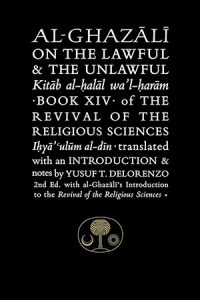Al-Ghazali on the Lawful & the Unlawful (Ihya Ulumuddin Series No. 14)

Author: Imām Al-Ghazali
Translator: Yusuf T. DeLorenzo
Publisher: Islamic Texts Society
Year of Publication: 2014
Print Length: 354 pages
Genre: Islamic Studies / Quranic Studies; Theology, Ethics and Philosophy; Islamic Law & Jurisprudence, Science; Qur’anic Reflection, Supplication & Prayers; Non-Fiction / Religious Studies
Topic: Islam, Qur’an, Ethics & Morality; Law, Jurisprudence, Legal Theory; Law Enforcement
Al-Ghazali’s Book of the Lawful and the Unlawful is the fourteenth chapter of The Revival of the Religious Sciences, which is widely considered as the greatest work of Islamic spirituality. Written by one of the most famous of theologian-mystics of all time, The Book of the Lawful and the Unlawful is unlike other Islamic works concerned with legal issues.
Here, Abu Hamid al-Ghazali aims to teach his readers firstly the theory of what is lawful and what is unlawful and how to deal with dubious or ambiguous issues, and secondly how to apply the knowledge they have gained to their everyday lives. The main support for this application, especially in matters that are unclear, is caution or prudence (wara) and Ghazali explains the degrees of prudence necessary beginning with the prudence of the upright and ending with the prudence of the saintly. Thus the sincere practice of what is lawful and desisting from what is unlawful become integrated into one’s spiritual life. As in his other works, Ghazali bases himself on the Qur’an and narrations from the Prophet Muhammad, followed by examples from the Companions, the Successor generations and the pious Predecessors.
Table of Contents
Al-Ghazāli’s Introduction to the Revival of the Religious Sciences
Preface
Introduction
THE BOOK OF THE LAWFUL AND THE UNLAWFUL
Prologue
Chapter 1. On the Excellence of the Lawful and the Reprehensibility of the Unlawful with an Exposition of the Kinds of Lawful and their Rankings and of the Categories of Unlawful and the Degrees of Caution Exercised in Relation to These
Chapter 2. The Degrees of the Dubious, Its Causes and How it is Distinguished from the Lawful and the Unlawful
Chapter 3. On Scrutiny and Inquiry or Silence and Disregard and their Indications
Chapter 4. Extricating the Repentant from Financial Iniquity
Chapter 5. Grants and Gifts made by Rules and which of these may be Considered Lawful and which Unlawful
Chapter 6. What is Lawful in Regard to Socialising with Despotic Rulers and Others; and the Categorisation of Attendance at their Courts, of Calling on them and of Showing them Respect
Chapter 7. A Variety of Issues of Such Importance that Questions Concerning them are Asked in the Fatwā Literature
Notes
Appendix: Persons Cited in Text
Bibliography
Index to Qur’ānic Quotations
General Index

Imām Abu Hamid al-Ghazali is a 11th century Muslim scholar. He was one of the most prominent and influential philosophers, theologians, jurists, and mystics of Sunni Islam. Al-Ghazālī was born at Ṭūs (near Mashhad in eastern Iran) and was educated there, then in Jorjān, and finally at Nishapur (Neyshābūr), where his teacher was al-Juwaynī, who earned the title of imām al-ḥaramayn (the imam of the two sacred cities of Mecca and Medina). He was active at a time when Sunni theology had just passed through its consolidation and entered a period of intense challenges from Shiite Ismâ’îlite theology and the Arabic tradition of Aristotelian philosophy (falsafa). Al-Ghazâlî understood the importance of falsafa and developed a complex response that rejected and condemned some of its teachings, while it also allowed him to accept and apply others. His great work, Iḥyāʾ ʿulūm al-dīn or Ihya Ulumuddin (“The Revival of the Religious Sciences”), made Sufism (Islamic mysticism) an acceptable part of orthodox Islam.
Source: https://plato.stanford.edu/entries/al-ghazali/
More from Imam al-Ghazali in this library, click here.

Yusuf Talal DeLorenzo is is a scholar of Islamic Transactional Law and a Chief Shariah Officer at Shariah Capital. Based in the Washington, DC area, he has served as a Shari’ah advisor to dozens of international financial entities, including index providers, institutional investors, home finance providers, international investment banks and a variety of asset managers. He is the author of a number of works on Islamic Law and Finance including Compendium of Legal Opinions on the Operations of Islamic Banks.
Source: https://www.abana.co/event/speakers/yusuf-talal-delorenzo/
More from Yusuf T. DeLorenzo in this library, click here.
